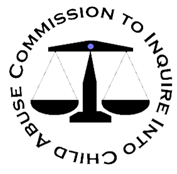COMMISSION TO INQUIRE INTO CHILD ABUSE STATEMENT It has come to the attention of the Commission to Inquire into Child Abuse that in an article headed “Secret Church – State Deal and the Four Folders” written by Mr. Bruce Arnold, which appeared in the edition of the Irish Independent published on 25th January, 2003, reference was made to the Commission in the context of comments in relation to Folder Four annexed to an Agreement dated 5th June 2002. In particular, the Commission has noted with concern the following statements in the article:
“Most extraordinarily of all, Folder Four contains the record number of ‘each and every matter which is the subject matter of evidence to the Commission to Inquire into Child Abuse (the Laffoy Commission)’.
It may reasonably be asked how this Laffoy Commission material, whether documents or records of documents, names or other details, jumps from the premises of the Commission into Folder Four…
Such a transfer from Laffoy to these unknown guardians, is not authorised by the Commission to Inquire into Child Abuse Act of 2000…
Of course, if the Church runs an effective intelligence service it could have internal knowledge of everything going before the Laffoy Commission, and it could now be in the process of sending copies of these individual cases to be included in Folder Four.”
The Commission was not a party to the agreement referred to and had no involvement whatsoever with the compilation of Folder Four. The Commission requested a copy of Folder Four from the Department of Education and Science. A copy was furnished by the Department to the Commission with a covering letter stating that “this Folder was provided to the Department of Education and Science by CORI”. The Commission has examined Folder Four. It contains lists of complaints against sixteen of the eighteen Congregations of Religious identified in the index to Folder Four which were being investigated by the Investigation Committee at the time of the compilation of the lists. The only details contained in Folder Four in relation to the complaints listed are –
• The reference number allocated by the Investigation Committee to the complaint,
• The Congregation which managed the institution to which the complaint relates, • In some cases, the institution to which the complaint relates, and
• In one case, the period to which some of the cases relate.
In relation to each complaint that information was obtained by the relevant congregation through the preliminary inquiry process being conducted by the Investigation Committee in relation to the complaint in accordance with the provisions of the Act of 2000. In the course of each preliminary inquiry, the congregation which managed the institution to which the complaint relates, is requested to provide a statement in writing of the evidence it proposes to give the Investigation Committee in relation to the complaint under the provisions of the Act of 2000 (section 23).
There has been no transfer of information from the Investigation Committee of the Commission to any person or body other than in strict compliance with the provisions of the Act of 2000. It is not apparent from Folder Four that there has been any breach by any person or body which has obtained information from the Investigation Committee in accordance with the provisions of the Act of 2000 of the confidentiality provisions which apply to the Investigation Committee.
The prohibition on disclosure of information provided to the Confidential Committee of the Commission contained in the Act of 2000 has been strictly enforced. No information as to the identity of the persons who have recounted or intend to recount their experiences to the Confidential Committee or the information they have given or intend to give has been divulged outside the Confidential Committee.
